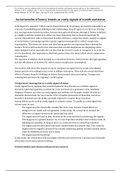Samenvatting
Article summary: Social benefits of luxury brands as costly signals of wealth and status - Nelissen, R. M. A., & Meijers, M. H. C. (2011).
- Instelling
- Wageningen University (WUR)
This is a summary of the article Social benefits of luxury brands as costly signals of wealth and status - Nelissen, R. M. A., & Meijers, M. H. C. (2011). It is part of the literature of the course Lifestyles and Consumption (CHL20806) at Wageningen university.
[Meer zien]




